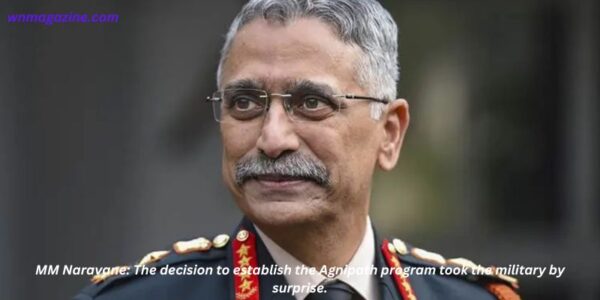MM Naravane: The decision to establish the Agnipath program took the military by surprise.

MM Naravane: The decision to establish the Agnipath program took the military by surprise.
In his memoir, former Chief of Army General Manoj Mukund Naravane revealed discussions with Prime Minister Narendra Modi regarding a proposed “tour duty” plan, allowing soldiers to enlist for a limited time. The unexpected introduction of the Agnipath scheme caught the Indian Army, Air Force, and Navy off guard.
Also read : wellhealthorganic vitamin b12
The Agnipath program enlists individuals aged 17.5 to 21 for a four-year term, with the option to retain 25% for an additional 15 years. Initial protests arose as candidates demanded permanent recruitment with pension benefits, prompting the government to raise the upper age limit to 23 after widespread demonstrations.
In Naravane’s memoir, “Four Stars of Destiny,” he detailed his conversation with the prime minister about a tour of duty plan, proposing limited-time enlistment similar to Short Service Commission officers. However, the plan was put on hold due to the COVID-19 pandemic and the conflict in Galwan.
According to Naravane, the PMO later expanded the proposal, mandating short-service requirements for the entire intake year for all three services. This surprised the Army, while the Navy and Air Force were caught completely off guard. The initial salary of Rs 20,000 per month for recruits was deemed unacceptable, later increased to Rs 30,000 based on recommendations.
Naravane criticized the inadequate compensation, emphasizing the disparity between skilled soldiers and daily wage workers. He argued that those defending the nation deserved better recognition. The memoir also recounted the India-China conflict in eastern Ladakh in June 2020, highlighting the message sent by the Indian Army in standing up to the “neighborhood bully.”
Also Read: Wellhealth Ayurvedic Health Tips
The hand-to-hand combat along the Line of Actual Control resulted in the bloodiest confrontation in 45 years, claiming the lives of twenty Indian soldiers. Naravane asserted that the Indian Army’s response conveyed a powerful message to the world, declaring “enough is enough.” Despite Beijing acknowledging casualties in February 2021, the full extent of the losses was initially concealed.







